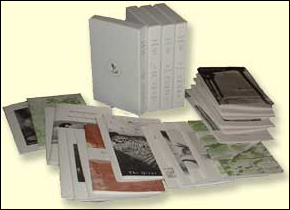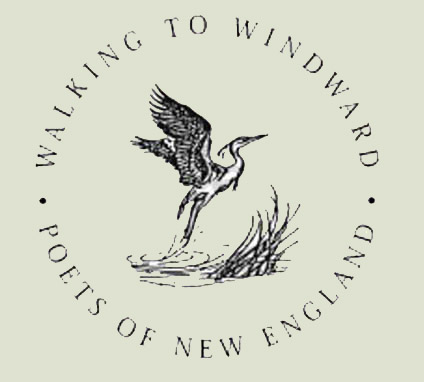Walking to Windward

|
21 New England Poets
Winners of the competition in 2001
Four Volumes for 20 Poets, Five poets per volume. Available as complete set or as single volumes or chapbooks.
|
Four individual slipcover volumes $35.00 each. Single chapbook, $8.00
Complete 4-volume set in slipcover boxes / Price: $80.00
For more information, contact Oyster
River Press

Click on volume for book
covers, book descriptions, and information about the authors:
- Volume I. I HEAR AMERICA SINGING
1. Robert Dunn I hear America singing: Sometimes it troubles me
2. Pat Fargnoli Lives of Others
3. Catherine O'Brian Lucky to be Born in a
House of Milk
& The White Nightgown
4. Mark DeCarteret The Great Apology
5. Julia Older City in the Sky
- Volume II. A BOOK OF HOURS
1. Julia Older The Ossabaw Book of Hours
2. Elizabeth Knies White Peonies
3. Jean Pedrick World of Grey & The Man in the Picture
4. Katherine Solomon Tempting Fate
5. J. Kates Mappemonde
- Volume III. INVOCATION
1. Kristen Lindquist Invocation to the Birds
2. Sidney Hall, Jr. Chebeague
3. Elizabeth Tibbetts Perfect Selves
4. W. E. Butts White Bees
5. Candice Stover Another Stopping Place
- Volume IV SIGHTINGS
1. L. R. Berger Sightings
2. Deborah Brown News from the Grate
3. Grace Mattern Fever of Unknown Origin
4. Rhina P. Espaillat Mundo y Palabra ~ The World & the Word
5. Betsy Sholl Coastal Bop
The Walking to
Windward collection was designed and typeset by Hobblebush Books.
Jenny MacPherson
reviewed the poems by outstanding New England poets:
I
Hear America Singing: Sometimes it troubles me. Robert Dunn, poet Laureate of Portsmouth NH, in 2001.
At times tongue in cheek and subtle,
at othertimes wider and more "in your face," but always there
is gentleness
and compassion underlying that humor.
Patricia
Fargnoli's Lives
of Others eschew any hint of the confessional. They describe other people's
worlds and their inhabitants,
or, like the three-page long, "Vathana Tells of Her
Hunger," are dramatic
monologues. As in all of Ms. Fargnoli's poetry, wonder and
energy shine through these poems' precise
language and haunting imagery.
Catherine O'Brian in Lucky
to be Born in a House of Milk and Poems from The White Nightgown
evoke narratives of her early life among servants in the Philippines. "The Amah" is powerful with its
repetitions and rhythms
that establish and echo at the poem's beginning and end. The poems of the
White Nightgown are fragments about the title garment, sensuous and delicate, often with ahaiku feel
to them.
The Great Apology,
by Mark DeCarteret, brims with poems
that pulse with quiet intensity,
often with anguish, sometimes with irony. Nature
imagery is plentiful and used well, Poems
range from haiku, through the
formal lines of "Bernadette the Saint," to longer, personal
narrative, such as the outstanding "My Aunt the Magnificent" and "Wish
You Were" where
we find such images as cramming/chaos down the moon's woeful throat
and Somewhere,
a dog howls/ at the spot the moon occupied,/ its
muzzle a black crust,/ its coat a net of locust.
The fifth chapbook that
completes Volume l, I Hear America Singing, in the Walking to
Windward series, and the first chapbook that begins
Volume ll, A Book of Hours, are both
by Julia
Older. City in the Sky is a collection of
a dozen poems inspired by the Native
Americans whom she visited in Mexico and the US SouthWest, where the Anasazi Indians
still lives.
Back to top
Volume II
In her second chapbook, The
Ossabaw Book of Hours, Julia Older's
sixteen poems suggest the primitive richness
of Ossabaw Island, a former plantation, later an artistic/scientific colony, now a state preserve, which lies off the
Georgia coast. These haunting poems arise from
theisland's almost overwhelming fecundity. Beginning with the
stunning "Midnight," each poem, through its nature-based imagery,
creates an innerworld which the poet gives
to us in now delicate, now fierce poems."Cabalistic Metaphor" shouldn't be missed.
Elizabeth
Knies' White Peonies is a
chapbook of heartfelt poetry centered on nature for its images and content.
In these quiet poems, she
ranges from country to city, and around the world from Kyoto to Cambridge
to St.
Petersburg. She recounts dreams and memories, and shines in her
ekphrastic verse based on such luminaries as
Monet, Borges, Montale, Holderlin
and Cartier-Bresson (photographer). "The Mourning Dove"
and
"Middle of Life" are two outstanding yet deceptively simple poems.
Jean
Pedrick's The World of Grey &
The Man in the Picture is two chapbooks in one. The first consists of
thirteen poems about objects
that bear the color grey: fog, ashes, mourning doves, tarmac, rainy
nights, and
so on. The second gives us poems of (you guessed it) men,
everyone from Bog Man and Potemkin through
carnival barkers. "At The
Albertina" and "Ave Atque Vale," a slightly longer poem, are particularly
noteworthy.
Tempting
Fate, by Katherine Solomon, is
poetry of transformation. In this series of poems we become
Sappho, Galatea, a witch casting spells,
a sculptor, a widow. The poet travels through Mexico and
envisions
the lives of those she meets, remembers playing cripple as a child when
polio was rampant,
and, in a heartbreakingly true and beautifully-crafted
poem called "Bread," she looks at war-torn Sarajevo,
drawing
unique and striking comparisons. She is a master in her use of imagery. "Hare"
and
"Accidental Light" are other standouts in an excellent
collection.
Mappemonde
is the work of a versatile poet, J. Kates.
The chapbookcontains found poems, a riddle,
free-verse narratives, rhymed
narrative and sonnets. Some are pervaded by a sense of grim irony, a
slightly jaundiced wit. Others are incredibly tender, such as "What
I Can Take," The Woman in my
Bed Talks about her Child," which,
along with "Painting in Blue," are poems that brilliantly
illuminate this chapbook
and make it shine. Thus ends the second volume of Walking to Windward.
Back to top
Volume III
Volume III, Invocation,
begins with the luminous chapbook, Invocation
to the Birds, by Kristen Lindquist.
These poems of transcendent joy revel in the daily miracles of everyday life, family and friends. They
are rich
with nature imagery and their endings are just wonderful. Especially notable are "Grandmother," with its
unforgettable line
We want to be good animals, "Hawk in a Tree, Roadside," and "Fall,"
which ends
Not thelosses to come,/ but the geese unspooling/ their ancient calls/ acrossthe daylit moon.
Sidney
Hall, Jr. is the author of the charming Chebeague,
which brims over with warm good-humor.
Reading "The Black Dogs of Chebeague,"
"The Women of Chebeague," and "The Men of Chebeague"
might
be an effective cure for depression. Mr. Hall's island creates the world as most of us
would like
it to be. And the poem with which he ends the chapbook, "A
Clean Thought" is a wry three-line gem
so representative of his understated humor:
So much more effective/ to be naked/ when you bathe.
Elizabeth
Tibbets demonstrates her skill in delineating worlds for
us with image and fine-tuned
narrative in Perfect
Selves. Many of these poems center around people the poet may have cared
for, the afflicted
and ill and very old, or their caretakers, the nurses themselves. We meet
such a
caregiver in the richly layered poem, "A Nurse Reads A Book
of Luminous Things." And the fine
lyric "When Lavender Comes"
is a gentle delight.
W.
E. Butts is present to us in White
Bees, a somewhat longer chapbook. The book begins
strongly with the powerful meditation on memory, "September" and follows it with such fine
poems as "Today,"
"Arboretum," and "At The Harbor," to name just a few of the memorable
poems he has given us in his book. His subject is the past and how it impinges
on the present,
how it haunts us and how it blesses us.
Another
Stopping Place, by Candice Stover,
is distinguished by its attention to
detail, to very specific detail in exterior and interior landscape. Her multi-layered
poems are poems of travel and memory
and dream. "Seven Postcards from Portugal"
is a series of
seven vignettes, each its own poem, yet part of the Portuguese landscape
they inhabit. "Envoy of the Absolutes" is a strong sestina and the
nine part poem "Off
the Map" is a fine ending to the chapbook.
The Rhetoric
of Fiction is a series of twelve chapters in a marriage, a bad abusive
marriage, by former Maine poet laureate Kate
Barnes. It is notable for its rich imagery,
clarity, and precision of language.
And, oh yes, the story: the woman escapes, still
longing for the blessing
of her mate, for some sort of vindication in memory. The last
poem, The
Dining Car, is outstanding. This chapbook completes Volume III.
Back to top
Volume IV
L.
R. Burger's chapbook, Sightings,
begins the fourth and final volume of the
Walking to Windward series, the volume appropriately,
also, named Sightings.
These fifteen poems feature birds, either as
subject or metaphor. There is one
exception: the affirming "The Crossing,"
celebrating human friendship and love,
with these final four lines, You
cannot speak for me,/ but when you speak I believe/
it is you that is speaking./
This sees me across. These are celebratory poems of the
natural world
that speak from an almost spare beauty and grace.
News from the
Grate comes from the pen of Deborah
Brown and places itself at the
opposite end of the spectrum in terms of subject. These
poems delineate the constellation
of family, using her own as model.
In these wry, yet somehow hungry, poems, she brings
us family life filled
with her grandmother's laughter, her mothers anger, her sister's difficult
death. She juxtaposes wonderful contrasts, such as her husband's tuna
sandwich with her own
poems ( "The Perfect Sandwich" ). As the
poet says in "TheDeath of a Mouse," This is a family story.
Grace
Mattern's Fever of Unknown Origin
rests upon imagery from the natural world to
express human feelings of passion, tenderness,
and exaltation. The birth of a child, children
and family, household
tasks (the outstanding "Laundry Basket" ), the passing of
time, and
the seasons are the subjects. This is poetry of continuity, of blessing. As
such it is quiet and
often understated so that the silences speak as profoundly
as the words. The poems "Passing,
Back to the Body,"
and the title poem should not be missed.
Rhina
P. Espaillat exhibits facility in use of the word in two
languages in
Mundo y Palabra: The World & the
Word: the first four poems are in both Spanish and
English.. For the most part, this is formal verse, traditional, rhymed poetry and Ms. Espaillat
is a skillful master
of the forms she uses, such as the sonnet. The poet's dry wit shines
in two
of them: "The Quetzal "and "Six of One." Among
other poems, "Bodega," "Solstice" and "
You Call Me By Old Names"
are outstanding.
In Coastal
Bop, the final chapbook in the series, poet Betsy
Sholl weaves jazz, the music
of everyday noise, and the sounds of coastal waters
into her narrative. We hear gospel music
mixed with the sounds of the
shower while learning how a daughter has reached recovery.
In the noisy
commotion of moving household appliances, her parent's declining health
is
the focus. Monk and Coltrane echo through Ms. Sholl's long, rhapsodic and
luxurious
phraseology; the masterful "Half the Music" consists
of six sentences spread over three
pages, yet the story is never lost or obscured.
It is fitting that Walking to Windward closes
with poems about the music in our lives.
Each of the twenty-one chapbooks
possesses its own brand of magic and
reviews such as these cannot communicate the skill and craft that
have
gone into their creation.
--Jenny MacPherson, Comstock
Review
Back to top
Return to Oyster River Press

